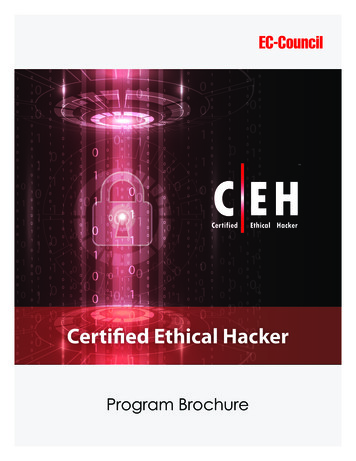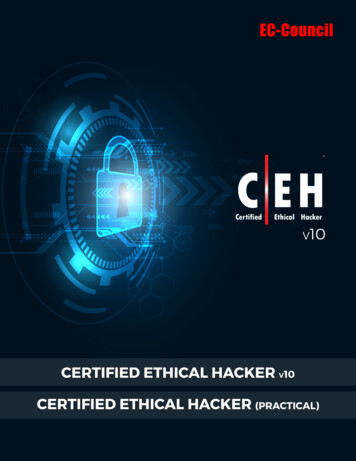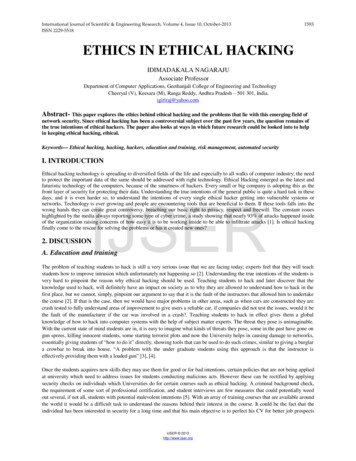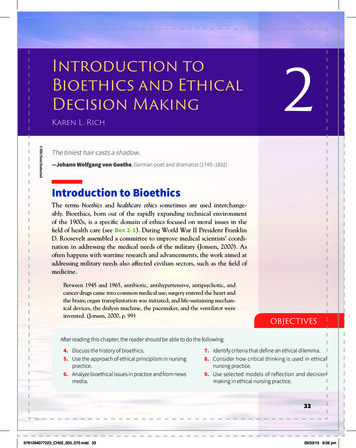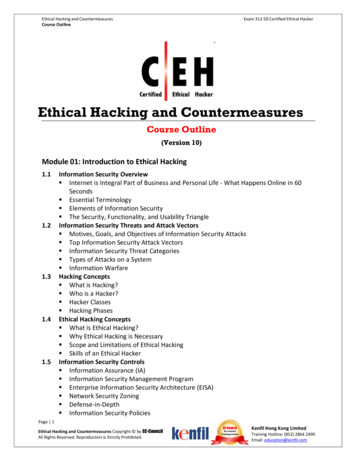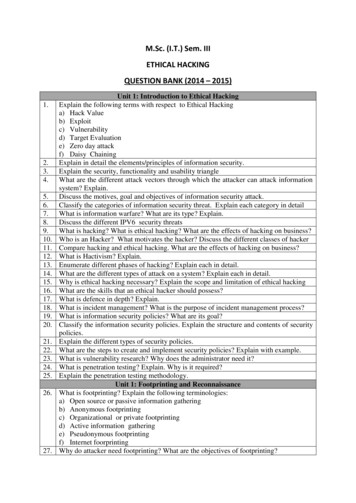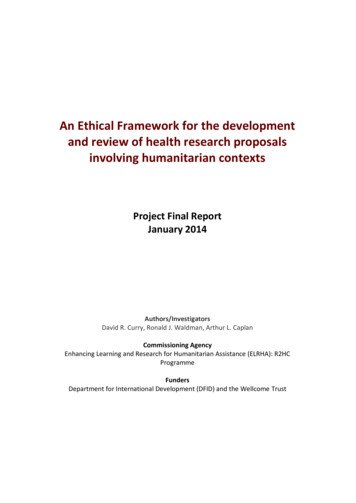
Transcription
An Ethical Framework for the developmentand review of health research proposalsinvolving humanitarian contextsProject Final ReportJanuary 2014Authors/InvestigatorsDavid R. Curry, Ronald J. Waldman, Arthur L. CaplanCommissioning AgencyEnhancing Learning and Research for Humanitarian Assistance (ELRHA): R2HCProgrammeFundersDepartment for International Development (DFID) and the Wellcome Trust1R2HC Ethical Framework Project – Final ReportJanuary 2014
Context NoteThis final report discusses a proposed ethical framework addressing research on health interventionsin humanitarian crises. The framework is intended to support and help ensure that health researchconducted in such crises is ethically sound by providing guidance and a review process for researchprotocols and their refinement. While the primary intent is to provide a tool for the R2HC FundingCommittee and its review of grant applications to support such research, the larger effectiveaudience includes researchers and their organizations (academic, NGO, agency, governmental,private); research ethics boards (REBs/IRBs) and similar review bodies; regulatory agencies; fundersand sponsors, and the interested public.This work was commissioned by the Research for Health in Humanitarian Crises (R2HC) Programmeof the Enhancing Learning and Research for Humanitarian Assistance (ELRHA) with funding byWellcome Trust and DFID. More on the award of this work here.Authors/InvestigatorsDavid R. Curry, MS, General Secretary of The Laureates ive.net/ and Executive Director ofthe Center for Vaccine Ethics and Policy at NYU Medical bout/ Correspondingauthor at nald J. Waldman MD, MPH, Professor of Global Health at the School ofPublic Health and Health Services at George Washington mployeeID 911 ; andArthur L. Caplan, PhD, Founding Head of the Division of Medical Ethicsat New York University Langone Medical al-ethicsDisclaimerThe ethical framework discussed here and all supporting work was developed by theauthors/investigators. They are solely responsible for the content of this paper. Observations,arguments and conclusions contained herein are not necessarily those of ELRHA, DFID or theWellcome Trust.AcknowledgementsThe authors wish to recognize and thank the many colleagues in the agency, government, NGO,academic, industry and other spheres who contributed to this work as informants and reviewers (alist of interviewees, informants and others we corresponded with appears at Appendix X). Specialthanks to Hannah Dashefsky, BA; Christopher Green, BS; Meghan Rogers, MA, and Jessica Wico fortheir roles in support of this project.2R2HC Ethical Framework Project – Final ReportJanuary 2014
1.0 AbstractThe authors propose an ethical framework to 1) guide development of research designs andprotocols intended for implementation in humanitarian crises and complex emergency contexts tohelp ensure their ethical viability, and 2) support ethical review of such protocols by independentethical review bodies (REBs, IRBs), funders, and other organizations of interest, and 3) serve generaleducational purposes and enhance public understanding of the issues involved in and ethicalprinciples guiding research in such settings. The framework is designed as a tool – offering a practicaland easily implementable approach in which key ethical principles are considered in a clustered,hierarchical order. Implementation and assessment of the utility of this approach by researchers andby REBs/IRBs considering research protocols involving humanitarian crisis setting will guide furtherrefinement of this ethical framework.Contents1.0 Abstract. 32.0 Project Context/Background .43.0 Literature Review 74.0 Scoping Observations. .185.0 Ethical Framework and Key Questions. 246.0 Discussion Supporting Key Questions 247.0 Summary 31Annex A Project Bibliography. .33Annex B Interviews/Meeting Contacts .41Annex C Search Strategies Summary .42Annex D Osaka Declaration .53Annex E MSF Framework (2013) .553R2HC Ethical Framework Project – Final ReportJanuary 2014
2.0 Project Context/BackgroundThe overall aim of the Research for Health in Humanitarian Crises (R2HC) programme is to improvehealth outcomes by strengthening the evidence base for public health interventions in humanitariancrises. The specific outcome of the programme will be to directly increase the quality and quantity ofcollaborative research on recognised public health challenges in humanitarian crises, leading toimproved health outcomes through evidence-based and cost-effective humanitarian interventions.The R2HC programme will:- Undertake a system wide Evidence Review to identify major challenges/evidence needsassociated with public health interventions in humanitarian contexts in order to inform theshaping of the research calls.- Facilitate research collaborations between public health researchers and either NGOs,multilateral agencies or both.- Establish a rapid response facility set aside for pre-approved research projects/consortia tobe set up and undertaken in the acute phase of an emergency. The facility will allowresearch to commence in the immediate aftermath of a humanitarian crisis and enable thegathering of rich data and trialling of specific interventions developed for acute disastersituations.In order to guide the R2HC programme and its Funding Committee on ethical dimensions of researchthe programme might fund, a decision was taken to commission development of an ethicalframework and guidelines. More here.The Terms of Reference for the ethical framework notes:“ There is considerable inconsistency in the quality and extent of the evidence base thatinforms public health interventions in the aftermath of disasters. There are two mainreasons for this: firstly, it is challenging, but not impossible, to conduct quality research insuch settings. Secondly, three groups – non-governmental organisations (NGOs), multilateralagencies, and academics have traditionally worked in relative isolation from each other inresponse to such crises.“Added to this, the ethical challenges of conducting public health research in disastersettings and/or alongside operational humanitarian programmes are a major considerationfor research teams and academic institutions seeking to work in this field. Prior consultationon this issue by the Wellcome Trust identified that while some good research on ethics hasbeen conducted by individual agencies and universities, the lack of comprehensive researchor widely agreed guidance on the issue is a major problem and a potential risk for researchprogrammes and funders.“ELRHA is therefore commissioning work to develop and agree a guiding framework for useby the R2HC programme. This work will include broad consultation and the identificationand collation of existing frameworks, research and good practice. A new framework for usewithin the R2HC programme will be developed out of this process and be widely circulatedfor consultation. It is important to note that this framework does not intend to take theplace of established ethical review processes within academic institutions and otherorganisations which undertake research. The R2HC framework and guidelines will be usedprincipally to inform potential applicants to the programme on the standards DFID and theWellcome Trust expect to be adhered to in funded research and which will be referred toduring the proposal appraisal and selection process.4R2HC Ethical Framework Project – Final ReportJanuary 2014
“Further research and testing of the utility of the framework in operational contexts will beconducted through the funded research programmes. It is intended that a final review of theframework will lead to it being published and potentially recognised internationally as a bestpractice standard ”The authors of this paper note the R2HC programme definitions for “humanitarian public health”,“humanitarian crisis” and “research” are intentionally broad and therefore the ethical frameworkdiscussed here is intended to address a wide spectrum of research opportunities. Humanitarianpublic health is defined for the purposes of the R2Hc programme as:Interventions that contribute collectively, in combination or singularly to saving lives, buildingresilience and promoting better health outcomes in humanitarian emergencies. In thisapproach public health interventions should be considered in their broadest scope includingall relevant practice areas including water, sanitation, nutrition and mental health.R2HC Programme, June 2013The graphic below, developed by the authors, is a depiction of the range of health interventions andissues which are understood to be included by the definition above and is derived from the scope ofhealth intervention areas considered as part of the Evidence Review commissioned by the R2HCprogramme.This work – led by Dr Karl Blanchett and Dr Bayard Roberts of the London School of Hygiene &Tropical Medicine – conducted “a system-wide Evidence Review to identify majorchallenges/evidence needs associated with public health interventions in humanitarian contexts.” Anoverview of the Evidence Review is available here and its final report is available here.5R2HC Ethical Framework Project – Final ReportJanuary 2014
We include below two key slides from this review from a June 2013 presentation. They depict the“state of evidence” supporting the field in this area. The data underscores the relative paucity of“strong” evidence in the literature in a broad range of contextual factor and health interventions.6R2HC Ethical Framework Project – Final ReportJanuary 2014
3.0 Literature ReviewThe project team conducted a set of literature searches using a range of literature databases toidentify substantive literature focused on ethical considerations surrounding health research inhumanitarian settings. This specific strategies and databases employed are summarized in Annex C.Important additions were suggested by informants who identified journal articles, other publishedmaterials, and programs/projects relevant to these themes. Additionally, some informants sharedmanuscripts and ethical frameworks in development by their organizations on a confidential basis.Finally, the authors utilized a visit to the WHO archives to determine what historical anchorage theremight be around ethical frameworks as they might apply to research on such health interventions.We highlight here selected literature from the process above and included in the projectbibliography in Annex A. Our principal rationales for inclusion here include: 1) the article ordocument contributes to a high-level chronology on how thinking has evolved on these themes overthe last twenty five years, and/or 2) the article or document aggregates and structures its discussionof ethical principles and themes in a way which is supportive of framework thinking.[1988]We begin by documenting the earliest example found from a WHO Archives “hand-search” ofrelevant printed indexes and finding aides to identify references to research, ethics, policies orstandards around health interventions in disaster and humanitarian settings.The Asian-Pacific Conference on Disaster Medicine, held 24 to 26 November 1988, under thesponsorship of the Japanese Association for Acute Medicine and the Japan InternationalCooperation Agency, resulted in The Osaka Declaration on Disaster Medicine [see full text in Annex Eand excerpt in Text box 1 below]. The declaration does not address ethics per se, but does recognizethe role of regional and international cooperation at the time of disasters, “in order to developsmooth cooperation mechanisms and to formulate study programs for disaster relief medicine.”Text box 1The Osaka Declaration on Disaster MedicineExcerpt [Accessed via index in paper-only compilation, WHO Archives, September 2013]PREAMBLE CONVINCED that to strengthen medical relief in order to minimize the amount of suffering and thenumber of victims, it is important to promote international cooperation both at ordinary times withpreventative systems, and at actual disaster times with concerted relief actions;WE REPRESENTATIVES of twenty nations and major international relief organizations herewith make thefollowingDECLARATION1. We shall continue our efforts to develop and fortify emergency medical systems for large scaledisasters worldwide by recognizing the problems associated with such disasters and discoveringeffective countermeasures.2. We shall make effort to improve in particular the Asian and Pacific countries’ capability of disastermedicine by developing channels of information exchange among such countries of the regionregarding disaster countermeasures.3. We shall internationally promote studies related to disaster prevention in collaboration with specialistsin non-medical fields and related sectors of science and technology, so that results can be properlyreflected in the administrative policies and multidisciplinary measures of each country.4. We shall deepen our understanding of the importance of regional and international cooperation at thetime of disaster, in order to develop smooth cooperation mechanisms and to formulate studyprograms for disaster relief medicine 7R2HC Ethical Framework Project – Final ReportJanuary 2014
[1990]The second example from the WHO Archives review comes from a 1990 meeting of EuroActDiswhich, in part, took up ethical issues surrounding research in disaster settings. This language {Textbox 2] from the minutes presents an interesting indicator of the thinking at that time.Text box 2Concerted European Action for Coping with DisasterMinutes of the EuroActDis Meeting, Paris, 19-20 April 1990[Accessed via index in paper-only compilation, WHO Archives, September 2013]II. Summary2) Ethical Issues and Ways of Intervention“It is unethical to withhold any intervention from victims of disasters. We must therefore conduct standardcontrolled trials, rather than placebo controlled trials or no-treatment controlled trials. The two questionswe have to define are first, what is the minimal ethical intervention; and second, what special riskprocedure can be offered to any participant in a trial who becomes suicidal, violent, psychotic, riskaddicted or substance dependent.”[1995]We believe the first milestone discussion in the literature addressing ethical concerns was generatedby WHO’s then operative Division of Emergency and Humanitarian Action (EHA). In 1995, EHApublished WHO/EHA 95.1 - Coping with major emergencies: WHO strategy and approach tohumanitarian action. 22 pages. WHO, Geneva, 1995 [available here].This document is an important, first articulation of WHO’s emerging role in complex emergenciesand proceeds from WHA and WHO Executive Board resolutions and other actions. It does notaddress research about health interventions that might be engaged in such emergencies or the fieldpractice standards that might be operative. It provides a useful snapshot of “early thinking” on theselarger themes.[1997]We see the first significant contribution to the ethics of research on health interventions inhumanitarian contexts in the 1997 report Consultation on Applied Health Research Priorities inComplex Emergencies. WHO/EHA 98.1 30 pages. WHO, Geneva; Limited distribution. [availablehere]We regard this as a seminal document that captures the health research dimension of the problemand primarily addresses health research priorities. But there is a strong treatment of ethics of suchresearch including a brief to the consultation group on the then relevant “globally applicable ethicaland scientific standards” for biomedical research on human subjects (p. 4), and a briefing on thedecades of preceding work by the WHO Advisory Committee on Health Research (ACHR), althoughnot specific to such research in emergency settings (p.5). General criteria for research in emergencysettings were laid out which resonate well some 16 years later (p.6).In “4.7 Ethics” (p.15) the core set of ethical foundation documents are referenced (Helsinki, CIOMS,etc.) and a few statements are worth presenting here [Text box 3].Text box 3“ It is the duty of relief agencies who take care of such victims to make sure that any researchproposal which includes them is approved by an ethical committee”“.Beneficence, autonomy (informed consent and confidentiality) and justice are the key elements inethical evaluation of research on human subjects and must also be the reference framework forresearch in complex emergencies ”Cont.8R2HC Ethical Framework Project – Final ReportJanuary 2014
Cont.Text box 3“ informed consent and (proof) of direct benefit to the individual concerned was considered to be ofprime importance all medical research and experimentation conducted on refugee populationsmust be so designed and performed that its results be of immediate and direct benefit to the studypopulation ”“ Special attention should be paid to avoidance of intrusiveness or damage. A question to posebefore the design of each study should be whether the problem could not be dealt with in a usual(non-CHE – complex humanitarian emergency) setting.”Among six recommendations made by the group were two of specific relevance to this project.The first involved developing guidance “on the need to establish an ethical review committee,specific to research on complex emergencies ”The purpose of the committee “could be (to provide a) voluntary peer review process of researchproposals ” and “advocacy: the committee would act as an advocacy group for raising ethicalawareness among scientists and humanitarian agencies who design and implement medical researchin refugee settings ”A companion recommendation was that WHO and UNHCR “set up an ethical expert group toprepare a template of ethical guidelines reflecting the overarching need to protect the rights, dignityand autonomy of research subjects in emergencies”Finally, in the Conclusions section, the report notes: “An ethical framework for conducting researchin emergencies should be based on existing clauses and instruments. The (additional) need wasexpressed to establish fact track procedures to disseminate information through publications andjournals.”[2000]The next milestone is the paper by Emanuel, Wendler and Grady in 2000: What Makes ClinicalResearch Ethical? (JAMA, 2000; 283: 2701-2711) [available here].This paper’s abstract helpful summarizes one of the first “frameworks” we encountered [Text box 4].Text box 4Abstract (formatting added)Many believe that informed consent makes clinical research ethical. However, informed consent isneither necessary nor sufficient for ethical clinical research. Drawing on the basic philosophies underlyingmajor codes, declarations, and other documents relevant to research with human subjects, we propose 7requirements that systematically elucidate a coherent framework for evaluating the ethics of clinicalresearch studies:(1) value—enhancements of health or knowledge must be derived from the research;(2) scientific validity—the research must be methodologically rigorous;(3) fair subject selection—scientific objectives, not vulnerability or privilege, and the potential for anddistribution of risks and benefits,should determine communities selected as study sites and the inclusion criteria for individual subjects;Cont.9R2HC Ethical Framework Project – Final ReportJanuary 2014
Cont.Text box 4(4) favorable risk-benefit ratio—within the context of standard clinical practice and the research protocol,risks must be minimized, potential benefits enhanced, and the potential benefits to individuals andknowledge gained for society must outweigh the risks;(5) independent review—unaffiliated individuals must review the research and approve, amend, orterminate it;(6) informed consent—individuals should be informed about the research and provide their voluntaryconsent; and(7) respect for enrolled subjects—subjects should have their privacy protected, the opportunity towithdraw, and their well-being monitored.Fulfilling all 7 requirements is necessary and sufficient to make clinical research ethical. Theserequirements are universal, although they must be adapted to the health, economic, cultural, andtechnological conditions in which clinical research is conducted.[2001]In 2001, Leaning proposed robust guidelines limiting such research in Ethics of research in refugeepopulations. The Lancet. Vol 357, May 5, 2001 [available here]Leaning’s guidelines are presented below [Text box 5]:Text box 5Proposed guidelines for research in refugee and internally displaced populations:: Undertake only those studies that are urgent and vital to the health and welfare of the studypopulation:: Restrict studies to those questions that cannot be addressed in any other context:: Restrict studies to those that would provide important direct benefit to the individuals recruited to thestudy or to the population from which the individuals come:: Ensure the study design imposes the absolute minimum of additional risk:: Select study participants on the basis of scientific principles without bias introduced by issues ofaccessibility, cost, or malleability:: Establish highest standards for obtaining informed consent from all individual study participants andwhere necessary and culturally appropriate from heads of household and community leaders (but thisconsent cannot substitute for individual consent):: Institute procedures to assess for, minimise, and monitor the risks to safety and confidentiality forindividual subjects, their community, and for their future security:: Promote the well-being, dignity, and autonomy of all study participants in all phases of the researchstudy[2004]Forward to 2004, we note the special section – The ethics of disaster research –Journal of TraumaticStress, October 2004, Volume 17, Issue 5, 361–448. [available here]This special section includes the following articles, helping move the discussion forward:- Ethical issues pertaining to research in the aftermath of disaster (pages 363–372), Lauren K.Collogan, Farris Tuma, Regina Dolan-Sewell, Susan Borja and Alan R. Fleischman, Abstract- Decision-making capacity and disaster research (pages 373–381), Donald L. Rosenstein, Abstract- The risks and benefits of participating in trauma-focused research studies (pages 383–394), ElanaNewman and Danny G. Kaloupek, Abstract10R2HC Ethical Framework Project – Final ReportJanuary 2014
- The concept of vulnerability in disaster research (pages 395–402), Carol Levine, Abstract[2009]We judge the next milestone to be 2009 with three papers of significance.The first is Conducting Research in Disease Outbreaks. Macklin and Cowan (2009) PLoS Negl TropDis 3(4): e335. doi:10.1371/journal.pntd.0000335 [available here]. The authors explore the formsand depth of ethical review around research on disease outbreaks, a subset of the larger sphere ofhumanitarian crises and complex emergencies.They argue that “some form of ethical oversight is needed to conduct an investigation of a diseaseoutbreak” but that the specific mechanism and procedures “can vary” depending on thecircumstances and context. We see a balance being explored to enable appropriate and timelyresearch to proceed on outbreaks, while helping ensure that the “rights and welfare of individualsare protected in disease outbreaks and that communities maintain trust in public health researchand practice.”The second and third papers listed just below are linked insofar as they both address, overall, theMSF ethical framework applied by its internal research ethics board against research proposed byMSF staff in various roles:- Research Ethics Review in Humanitarian Contexts: The Experience of the Independent EthicsReview Board of Médecins Sans Frontières. Schopper D, Upshur R, Matthys F, Singh JA, BandewarSS, et al. (2009). PLoS Med 6(7): e1000115. doi:10.1371/journal.pmed.1000115 [available here]- Ethics of conducting research in conflict settings. Nathan Ford, Edward J Mills, Rony Zachariah andRoss Upshur. Conflict and Health 2009, 3:7 doi:10.1186/1752-1505-3-7 [available here]The Schopper paper’s “Summary Points” note that in 2001, the international humanitarian aidorganisation Médecins Sans Frontières decided to constitute an independent ethics review board toensure that the increasing amount of operational and clinical research it undertakes is scientificallyvalid and ethical. This article describes the functioning of this ethics review board and thechallenging ethical issues that it has discussed since its inception.The Ford paper provides a specific discussion of the MSF ethical review framework in place at thetime and now refined (see 2013 discussion following). We excerpt the elements of this frameworkand the initial description below [Text box 6].Text box 6:: Collaborative Partnership Researchers should engage in partnership with national and/or internationalresearch institutions as relevant and appropriate :: Community engagement Researchers should respect the community's values, culture, traditions, andsocial practices; involve the community in the design and implementation of research through aconsultative process; and share fairly any financial and other rewards of the research :: Social value Beneficiaries should be clearly specified, and the importance of the health problems beinginvestigated and the prospect of value of the research for the beneficiaries made clear Efforts should bemade to avoid diverting resources from health services for the conduct of research :: Scientific Validity Research design should optimize possibilities of achieving the social valuerequirements. Research should be feasible given the social, political, and cultural environment and withsustainable improvements in the local health care and physical infrastructure Fair selection of participants Study population should be selected in such a way as to ensure scientificvalidity of the research and minimize the risks of the research Favourable Harm-Benefit Ratio Protocol should clearly assess potential harms and benefits to the studyparticipants and the harm-benefit ratio for the community.Informed consent Study community should be involved in establishing appropriate recruitmentprocedures and incentives for the participants. Consent procedures should be acceptable and practicalwithin the study community 11R2HC Ethical Framework Project – Final ReportJanuary 2014
Also in 2009, a WHO consultation added perspectives to the issues involved in Research ethics ininternational epidemic response : WHO technical consultation, Geneva, Switzerland, 10-11 June2009 [available here]. We excerpt extensively from the Executive Summary reflecting its relevance tothis project [Text box 7].Text box 7:: In many countries, most research with human participants must undergo prospective ethical reviewby a research ethics committee (REC), while activities characterized as public health or clinical practiceare not subject to this requirement. However, distinguishing between research and practice iscomplicated by the fact that there is a significant area of overlap in these activities in terms of methodology, systematization of investigation, and the outcome of producing generalizable knowledge :: The ultimate goal for public policy should be to ensure that most, if not all, emergency public healthactivities are subject to some form of ethical oversight, whether or not those activities are formallycharacterized as research. The specific nature of the oversight should be commensurate with theactivity’s objectives, methods, risks and benefits, as well as the extent to which the activity involvesvulnerable groups.:: To achieve this goal, it is crucial to streamline the ethics review process and to establish appropriate,flexible mechanisms and procedures for ethical oversight not limited to traditional REC systems.:: While some crucial emergency health research should still undergo full REC review because ofsignificant risks to individuals or populations under study, a “fast-track” review approach should also beadopted. However, review should not be expedient to the point of dropping or narrowing ethicalprinciples.:: Options for promoting fast-track review of emergency research include adjusting the balance between in-person and electronic communications by REC members; the use of pre-emergency repositoriesof study protocols or protocol parts which could be submitted to RECs for ethical pre-screening; thecreation of special emergency research RECs, perhaps on a national or regional level; and, where there isno other feasible option, greater reliance on retrospective rather than prospective ethics review, withsafeguards to address non-compliant or sub-standard research ethics conduct.:: Public health activities that are classified as practice may raise important ethical issues. Stakeholdersshould formulate plans to ensure that such activities receive appropriate and timely ethical review. Oneoption to consider, at least in some situations, is review by special committees with appropriateexpertise and experience to examine procedures and methods specific to a public health practice. Foractivities that do not warrant committee review, or in countries that choose not to institute a committeereview structure, public health practitioners can be equipped with tools to help them assess whethertheir planned activities comport with principles of public health ethics. Training modules for researchethics committees and public health professionals should be created to support this goal.:: There is a critical need f
help ensure their ethical viability, and 2) support ethical review of such protocols by independent ethical review bodies (REBs, IRBs), funders, and other organizations of interest, and 3) serve general educational purposes and enhance public understanding of the issues involved in and ethical principles guiding research in such settings.




